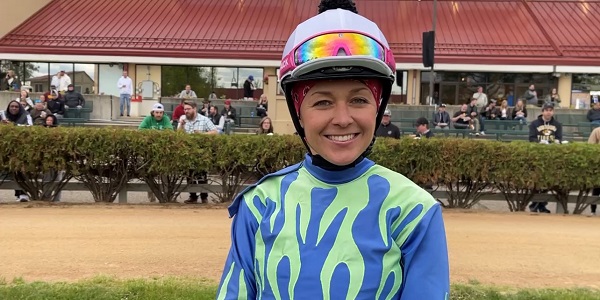Jockey Sofia Barandela’s professional riding career began in 2021, when she was 35 years old. Her first victory was fall of that year on Intimidating at Arapahoe Park in suburban Denver.
“It has been challenging, it has been rewarding,” Barandela said. “I have met so many wonderful people, and I have traveled to places I wouldn’t even think of.”
Barandela rode her first race on the Canterbury Park turf course Saturday, May 21 on Unbroken Song, trained by Nevada Litfin. Before arriving at Canterbury, she was traveling around the world.
She was born in Mexico and decided to pursue an education in Veterinary Studies in Germany. After finishing her degree, she returned to her family in Mexico to follow her dream of being a jockey. A personal tragedy changed Barandela’s plans and she started to reconnect with horses for therapeutic reasons, beginning to gallop in Mexico in 2012.
“I started getting into it as a form of therapy and it just became again my lifestyle and my dream come true,” Barandela said.
Growing up in a family that loved horses and animals, Barandela’s grandpa fueled the love for horseracing in her. He owned quarter horses and told her about horseracing, so she told him she wanted to be a jockey. Barandela then traveled Europe, continuing to gallop and learning about horses before she moved to the United States because her dream “was in the United States.” In Spain, Barandela galloped at La Zarzuela Racetrack in Madrid. After all her travels, Barandela can speak three languages: English, Spanish and German.
She lived in Phoenix and then moved to California, learning her galloping style. An old friend called her last summer, telling her to start riding in Wyoming.
Being a female jockey has brought Barandela challenges, when she was little, her grandpa always kept her away from the racetrack.
“He said it was a sport for man,” Barandela said. “At those times, there weren’t women around the racetrack.”
Barandela said that racetracks are evolving and she wasn’t surprised to see more women involved in the racetrack process when she arrived to the United States, but there are still challenges female jockeys face.
“They say we’re not as strong as a man,” Barandela said. “I think women many times connect better with the horses than men do.”
With her family still in Mexico, Germany and Spain, Barandela expressed the difficulty of loneliness and the challenge of having a family that women have to face at the racetrack.
“If you’re a woman following your dream and you have to travel or move, a man isn’t willing to follow you every time,” Barandela said.
Barandela said she hopes people recognize her as the jockey who always rides her hardest, no matter the trainer, owner or race.
“Every time I’m on a horse, I am so grateful because it is a privilege because you don’t know if it is the last time,” Barandela said.
story and video by Natalie Hoepner
